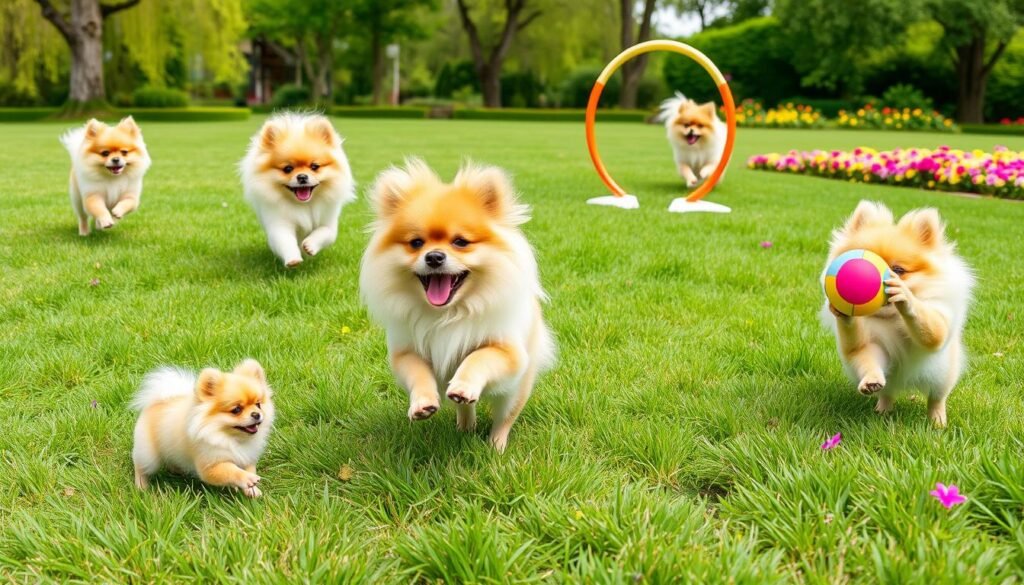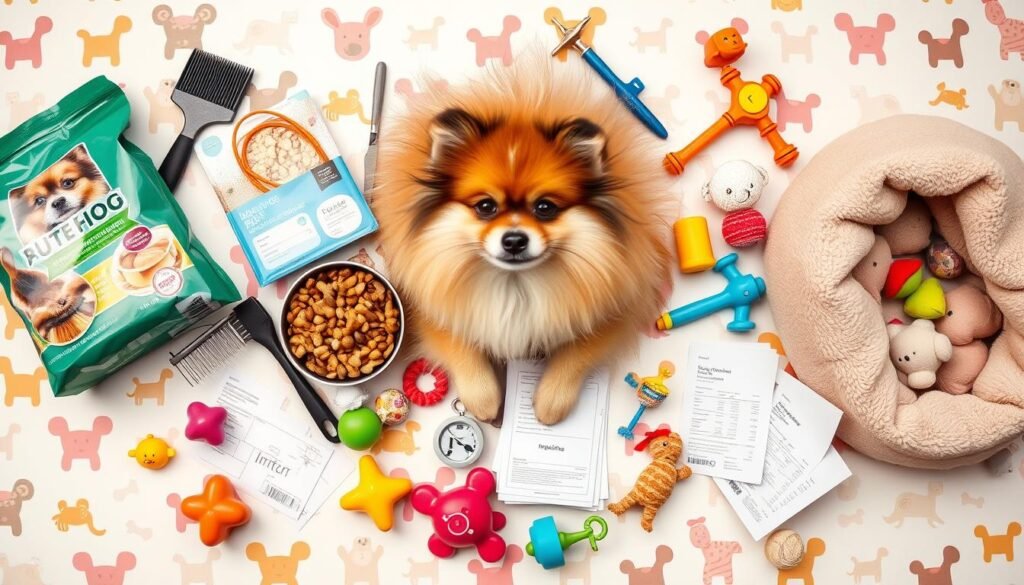Thinking of getting a new pet? You might wonder if Pomeranians are good for families. They look cute, but are they really right for you? Let’s look at the good and bad sides of having a Pomeranian.
Pomeranians come from Germany and have a long history. They are small but full of energy and curiosity. But are they the best fit for families? We need to look at their personality, how much energy they have, and how much grooming they need.
Pomeranians are small and fit well in small homes. They have big personalities and look great with their fluffy tails. But, they also need regular grooming and food, and might have health issues.
Pomeranians are smart and watchful, making them good watchdogs. But, they can be very loud. This is something to think about when deciding if they’re right for your home.
Having a Pomeranian is a big responsibility. It’s a journey full of joy and hard work. Let’s explore what it means to have a Pomeranian in your life. Is their company worth it? Let’s find out.
Pomeranian Origins: A Breed Overview
Explore the pomeranian history starting in Germany. This breed is full of energy and charm. Pomeranians are great pets for small spaces because of their size and personality.
The German Roots of Pomeranians: Breed History
The Pomeranian breed comes from Germany. They were once big and used for herding. Now, they are smaller and make wonderful pets.
They have a long history of being loved by royalty. This shows how special they are.
Distinguishing Features and Size: Understanding Pomeranians
Pomeranians have a thick double coat and a fox-like face. They are lively and easy to spot. Their big eyes and small ears make them look always ready to play.
They are small, with adults being 8 to 11 inches tall. They weigh 3 to 7 pounds. This makes them tiny but full of energy and charm.
Pomeranians are loved by many. They are lively but easy to care for. They are perfect for small homes and families.
Is Early Adoption of Pomeranians Beneficial For Families?
Thinking about getting a new pet? The time you adopt matters a lot. Adopting a Pomeranian early, between 8 to 12 weeks, is best. This time is key for bonding and learning important skills.
Adopting a Pomeranian young has many benefits. Puppies learn fast and enjoy new things at this age. Meeting new people and pets helps them grow well.
Puppy socialisation and training are very important. Pomeranians are smart and fun. Training them early helps them behave well later.
Getting a puppy young also strengthens your bond. They learn to love their new home and family. This makes them loyal and happy.
So, adopting a Pomeranian early is more than just getting a puppy. It’s about starting a lifelong friendship. It helps with puppy socialisation and training too. This makes your life together better.
Pomeranian Temperament: A Good Fit for Family Life?
Thinking about getting a Pomeranian for your family? It’s important to know their temperament. They are lively and full of energy. This makes them great for families with kids.
They are small but full of joy. They can make any day brighter. This is because of their playful nature.
The pomeranian trainability is a big plus. They are smart and love to please. This makes them easy to teach.
They learn quickly. This is great for families that like to do new things. It shows they are adaptable and fun to be around.
Playful and Energetic Nature
Pomeranians love to play and go for walks. They may be small, but they have lots of energy. This makes them perfect for kids who are always on the go.
They make every day fun. Just being around them can make you feel happier.
Intelligence and Trainability
Pomeranians are very smart. They learn fast and enjoy training. This makes them great to teach and fun to have around.
They are good at learning good habits. This is helpful for families who want their pets to behave well.
Loyalty and Protective Instincts
The pomeranian loyalty is strong. They bond deeply with their owners. Even though they are small, they will protect their family.
They will warn you of any danger. Their loyalty and protective nature make them more than pets. They are like family members.
The pomeranian temperament is special. They are playful, smart, and loyal. These traits make them wonderful family pets. They bring joy and protection to any home.
Compatibility of Pomeranians with Children and Pets
Adding a Pomeranian to a home with kids or pets needs careful thought. Pomeranians are lively and small, so they need watching, especially with young ones and big pets.

Pomeranians with children can be very loving and fun. But, their small size means they might get hurt by rough play from little kids. It’s important to watch them closely to keep everyone safe.
With Pomeranians and pets, things can get interesting. Pomeranians can be quite bold, which might scare other animals. When introducing them, do it slowly and carefully. This helps everyone get along without fights.
To make sure Pomeranians fit in well, families need to watch them closely and teach them to get along. With the right care, a Pomeranian can become a happy and loved family member.
Are Pomeranians Good for Families? Pros and Cons of Owning a Pomeranian
Pomeranians are lively and loving, making them great for families. They are perfect for small homes because they are tiny. This makes owning a Pomeranian great for city living.
Pomeranians love their families and are very loyal. They are alert and can warn you of danger. They are smart and fun to train, adding joy to your life.
But, there are some downsides to having a Pomeranian. They can bark a lot, which might bother neighbours. They also need a lot of grooming to keep their fur nice. And, because they are small, they need to be careful around big animals and little kids.
Pomeranians offer the dual attributes of being compact enough for small living areas yet spirited enough to fill a home with energy and protection.
Thinking about the pomeranian family pet pros and cons, it’s clear they are wonderful pets. But, they need time and care for their grooming. They are perfect for families who want a playful and loyal friend. A Pomeranian can bring happiness to any home, big or small.
Understanding Pomeranian Health: What You Need to Know
Thinking of getting a Pomeranian? It’s key to know about their health needs. They are small but full of life. They need special care to live a long, happy life.
Typical Lifespan of a Pomeranian
Pomeranians usually live between 12 to 16 years. Their life span depends on their diet, exercise, and vet visits. Knowing how to keep them healthy is very important.
Common Health Issues in Pomeranians
Pomeranians face certain health problems. They can get dental issues because of their small mouths. They might also have knee problems. It’s important to watch for these and take action early.
Take them to the vet often and clean their teeth. Watch for any knee pain to avoid bigger problems.
Having a Pomeranian can be very rewarding. They are happy and loving. But, it’s crucial to take care of their health. This includes knowing about common Pomeranian health issues and helping them live a long life.
Navigating Pomeranian Shedding and Grooming
Thinking about getting a Pomeranian? You must know about their pomeranian shedding and pomeranian grooming needs. Their beautiful coat needs a lot of care.
The Reality of Pomeranian Shedding
Pomeranians have a double coat that sheds a lot, especially in spring and autumn. Brushing them often helps keep your home hair-free. It also keeps their coat healthy and shiny.
Good grooming stops mats and keeps your home clean. It’s key to managing their shedding.
Grooming Essentials for Pomeranian Care
Grooming your Pomeranian regularly is a must. It’s not just for looks; it keeps their skin and fur healthy. It also strengthens your bond with them.
Even though they’re small, grooming costs are not high. It’s important for their health, especially their undercoat.
For grooming, use baths, brushes, and haircuts. These keep shedding under control and your Pomeranian looking great. They need a special brush for their double coat.
Pomeranian families must be prepared for multiple grooming sessions each week, which become integral to your routine, ensuring a healthy, happy Pomeranian.
Adding grooming to your routine helps manage shedding. It also keeps your Pomeranian happy and healthy. They’ll be a joy to have for many years.
The Exercise Needs of a Pomeranian
Pomeranians are small but need lots of exercise. They love to move and think. Without enough activity, they might bark too much or feel anxious.
It’s important to give them daily walks. These walks let them explore and play. They also need playtime with toys or games to keep their minds sharp.
Structured playtime helps meet the pomeranian exercise needs and promotes a well-balanced lifestyle, necessary for both physical health and behavioural wellness.

Playing games like fetch or tug-of-war is great. It makes the bond between you and your dog stronger. It also keeps your dog’s energy levels right.
By mixing walks with games, your Pomeranian will stay happy and healthy. A regular exercise routine keeps them well and makes your home a happy place.
Living Spaces: Are Pomeranians Suitable for Apartments?
Pomeranians are great for small homes because they are tiny. They fit well in places big dogs can’t. This makes them perfect for apartments.
To make a Pomeranian-friendly home, you need to know what they like. They love to play and be active. But, they can bark a lot, especially if they hear strange noises.
Small Size: Big Advantages for Apartment Dwellers
Pomeranians are really small. They are only 8 to 11 inches tall and weigh 3-7 pounds. This means they don’t feel cramped in small spaces.
Creating a Pomeranian-Friendly Home Environment
Creating a Pomeranian-friendly home is more than just size. It’s about making sure they are safe and comfy. You should have special areas for eating, sleeping, and playing.
This helps keep them safe and happy. Making sure your home fits their needs makes life better for both you and your Pomeranian.
Costs of Pomeranian Parenthood: Budgeting for a Furry Family Member
Getting a Pomeranian is a big and happy choice. It’s important to know how much it costs. You need to think about the first costs, regular expenses, and unexpected bills.
Initial Adoption Costs and Monthly Expenses
Adopting a Pomeranian is a special moment for any family. The first costs include the adoption fee, which changes based on the dog’s age and breed. You also need to pay for vet visits for shots, microchipping, and spaying or neutering.
Every month, you’ll spend money on food, grooming, and vet visits. This can cost between ₹3300 to ₹5400. It shows the monthly costs of having a Pomeranian.
Long-term Financial Commitment to Pomeranian Care
Having a Pomeranian is a big financial promise, as they live for 12 to 16 years. The costs go beyond basic needs. A good diet costs around ₹1200 to ₹1800 a month.
They also need regular grooming, which can be expensive. And, you should plan for any health problems that might happen. This could mean big vet bills.

Before getting a Pomeranian, check if you can afford their needs. By getting ready for all costs, you can make sure your Pomeranian is happy and healthy at home.
Training and Socialising Your Pomeranian for Family Life
Getting a Pomeranian into your family needs careful pomeranian training and socialisation. These dogs are smart and love to learn. They do best when they’re well-trained and socialised.
It’s best to get a Pomeranian when they’re 8 to 12 weeks old. This age is perfect for learning new things. It helps them get along with people and other animals later on.
Teach your Pomeranian basic commands like ‘sit’, ‘stay’, and ‘come’. Use treats and praise to make learning fun. This helps them learn faster and enjoy it more.
It’s important to introduce your Pomeranian to different places, sounds, and people. This makes them friendly and well-adjusted.
Make your home safe and welcoming for your Pomeranian. Give them a comfy place to rest and safe areas to play. Also, give them the right toys.
Regular family time and visits from friends help them feel more at ease. This helps them not be too shy or nervous.
The aim of pomeranian training and socialisation is to build a strong bond. This bond helps them behave well and feel happy. It makes them a joy to have around.
Training and socialising your Pomeranian helps them fit in with your family. With patience and effort, they’ll learn commands and be calm in different situations. They’ll become a loving family member.
Feeding Your Pomeranian: Nutrition and Diet Considerations
It’s very important to feed your Pomeranian right. They need food that keeps them full of energy and healthy. Let’s look at what’s best for them.

Monthly Food Expenses for a Pomeranian
Feeding your Pomeranian well doesn’t have to cost a lot. You can spend between ₹1200 to ₹1800 a month. This depends on whether you buy food or make it with your vet’s help.
Essential Nutrients for Optimal Pomeranian Health
Pomeranians need carbs, proteins, fats, vitamins, and minerals. They should eat high-quality food to stay healthy. Protein helps their muscles, and fats give them energy.
Carbs are okay but not too much to avoid weight gain. A diet rich in fibre keeps their belly happy. Talking to a vet helps make sure your Pomeranian eats just right.
Selecting a Pomeranian Puppy: A Guide for Potential Families
Choosing a Pomeranian puppy means thinking about how they’ll fit into your family. These dogs live up to 16 years and need a lot of care. You need to find a puppy with the right energy and personality for your home.
Watch how puppies react to different things. The right puppy will match your family’s vibe. This is important for a happy home.
Pomeranian puppies grow and learn a lot from 8 to 12 weeks old. They are smart and loyal, but need early training. They get along well with people of all ages, but need careful handling around big pets or little kids.
Getting a Pomeranian puppy costs money. You’ll spend about £30 to £50 a month on their care. They also need special food and regular grooming.

